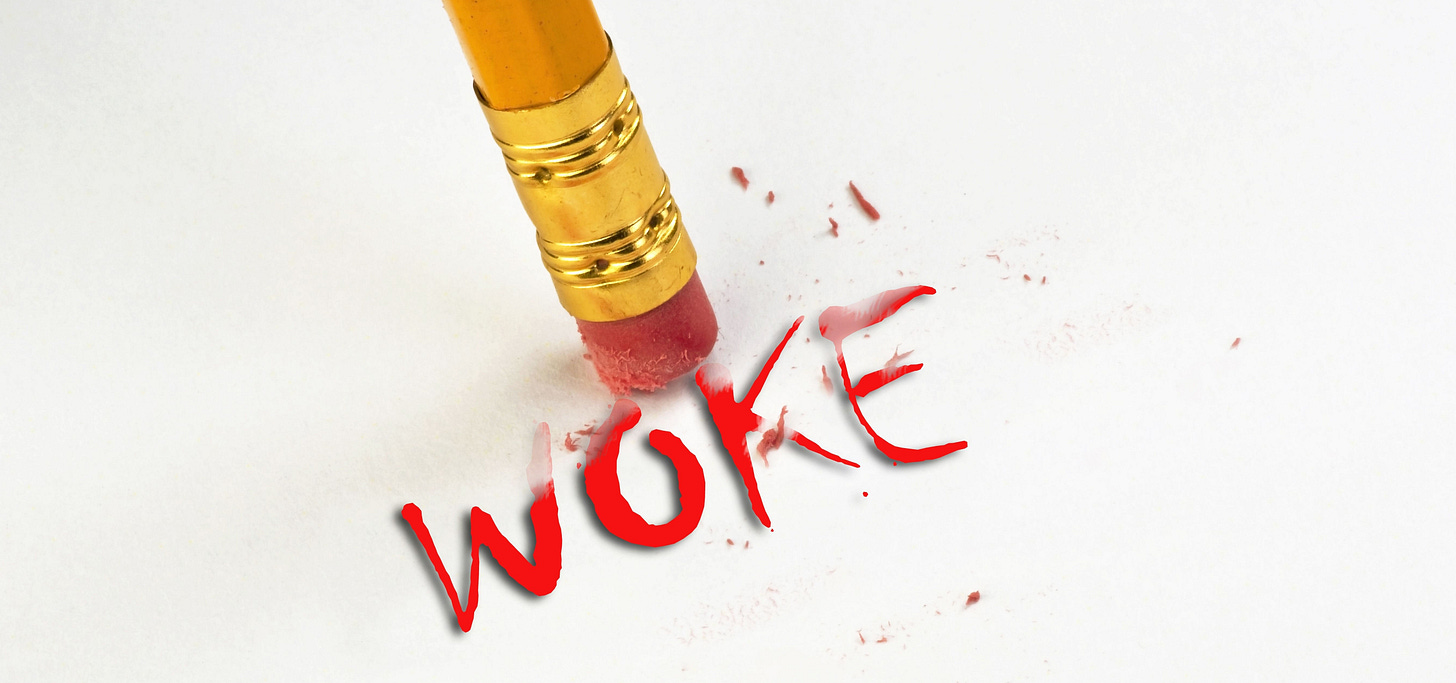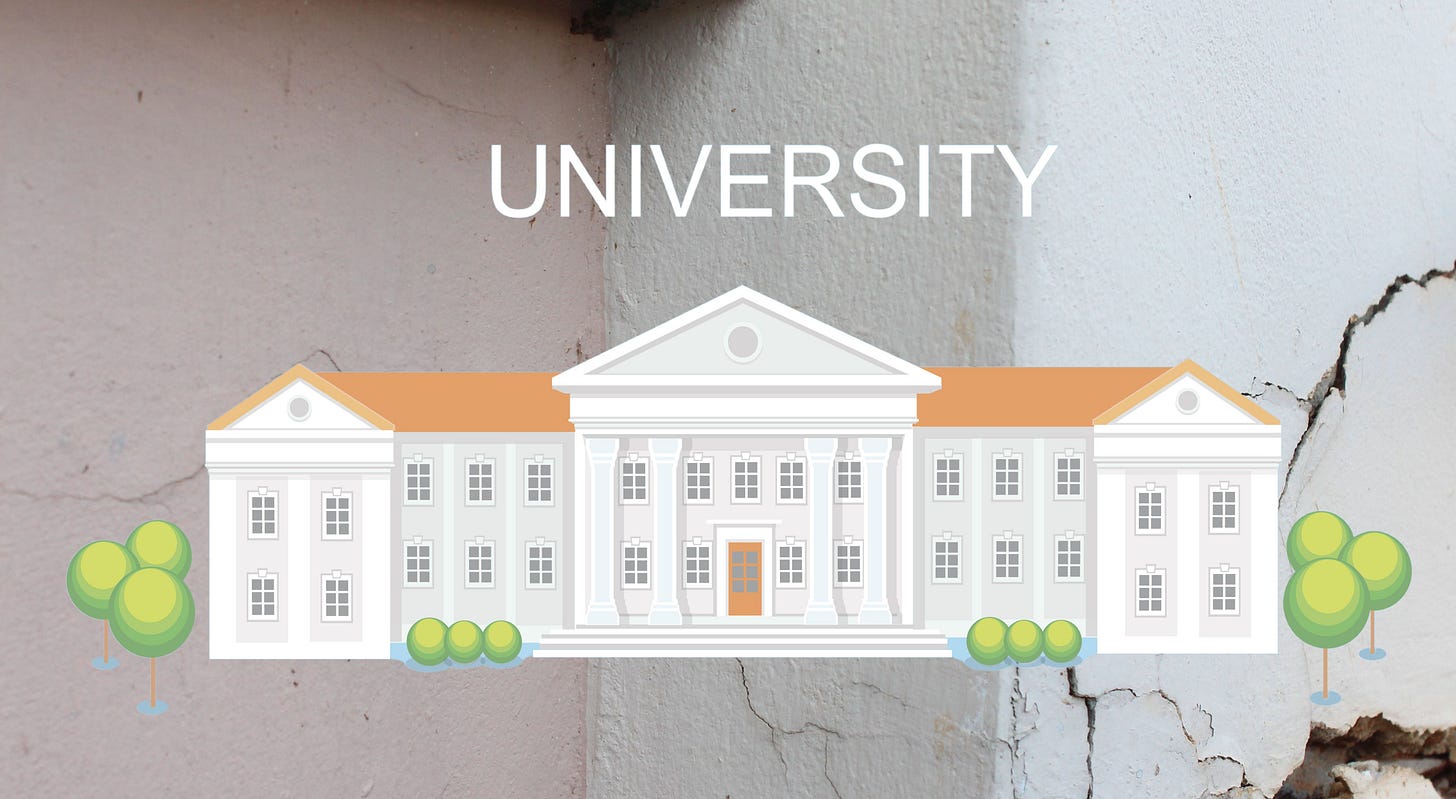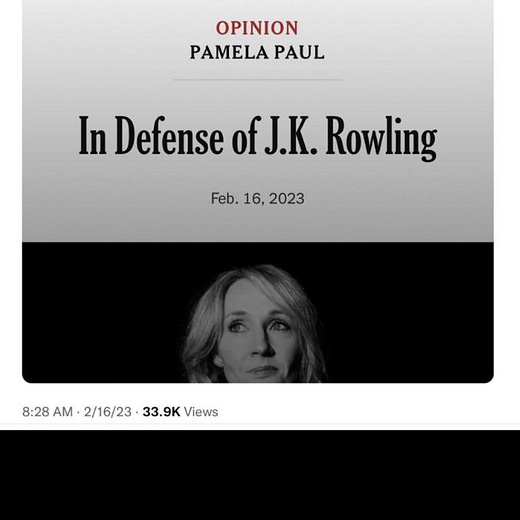E-Pluribus | February 17, 2023
Wokeism is getting sleepy; the destructive power of DEI; and making the case that J.K. Rowling is not a terrible person after all.
A round-up of the latest and best writing and musings on the rise of illiberalism in the public discourse:
Musa al-Gharbi: Woke-ism Is Winding Down
Perhaps it’s wishful thinking, but Musa al-Gharbi writing at Compact Magazine argues that the wokeism juggernaut is starting to run out of steam. al-Gharbi says the public just isn’t buying what the woke are selling as reality sets in.
It’s been ten straight years of heightened unrest in knowledge-economy institutions and knowledge-economy hubs. However, the wave has now begun to crest. We can see this in polls and surveys. White liberals, the Americans whose expressed views shifted most radically over the last decade, have begun to moderate their responses to questions, for instance, about the causes and ideal remedies to racial inequalities. There have been shifts in the ways people identify themselves, too. For instance, polling and surveys suggest that “feminist” and related labels seem to have lost some of their luster in recent years, including (and perhaps especially) among young people.
Data on media outputs and “cancel-culture” incidents also suggest that a corner may have been turned. Across a range of datasets, we see apparent declines in “grassroots” attempts to censor uncomfortable speech on campus (even as there are growing attempts to suppress political scholarship from external stakeholders). Media discussion of various forms of prejudice and discrimination also seem to have declined significantly over the last year.
Within the Democratic Party, following anemic 2020 results and recalls of progressive politicians in blue states, there have been efforts to “course correct,” to avoid further alienating normie voters. The Democratic base has moved in a similar direction, broadly rejecting progressive candidates during the 2022 primaries. These countermeasures likely helped the party stave off the anticipated “red wave,” preventing extreme Republican candidates from facing Democratic challengers who were also perceived to be far out of step with mainstream America. Running moderate Democratic candidates against GOP extremists proved to be a winning move throughout the country in 2022.
Read it all.
“Hypatia”: DEI Is Destroying My University
Writing (temporarily) under the pseudonym Hypatia at Colin Wright’s Reality’s Last Stand, a professor at a “top-tier private, ‘Power Five’ conference university” details how the diversity, equity, and inclusion agenda at his school is damaging its mission. The writer decries the “illiberal, anticompetitive, anti-individualistic, and in many respects, anti-American ethos” of DEI and calls for others to make a stand.
As a university marketing professor, I live two existences with almost insurmountable dissonance; one in mind (a pursuit of knowledge and intent to empower students with efficacy, grit, and intellectual curiosity), and one in practice (an appeasing modality under a wave of woke ideology). Our provost and every subordinate administrative stakeholder champions “diversity, equity, and inclusion” (DEI) causes, policy, and allocations of funds that are strikingly doctrined, rather than reasoned. To accompany a growing list of institutional DEI mandates, unwritten rules have emerged that are softly imposed through collegial or bullish pressure.
[ . . . ]
Over the past nine years in academia, I have pursued seemingly countless DEI training seminars, which are still deemed insufficient. This year, a caring colleague recommended three credential-issuing, multi-day (or longer) DEI trainings to provide me “ally” coverage. This “nudge” was to help avoid what they had endured the semester prior: a cross-examination by an ethics review board after a cohort of underperforming students were encouraged to challenge their grades to uncover the professor’s inherent biases. The professor was eventually exonerated, but only after enduring weeks of stress and intrusion. The students were collectively bolstered by campus-employed advocates of “multicultural information.” I have personally overheard one such administrator spiritedly levying the quote, “change the world one patriarchal actor at a time, especially on your campus,” which was likened to enlisting troops.
[ . . . ]
In my recent attempt to disavow a proposed requirement for all professors to publish a diversity statement on our faculty biographies, I offered parallels to an Orwellian mechanism for groupthink and a lack of agency in intelligentsia. I proclaimed academics as an essential community to help evolve zeitgeist opinionating by modeling critical thought and nuanced explorations in pursuit of enlightenment or respectful and constructive dialogic exchanges.
The reaction from the faculty committee was a parade of platitudes steeped in virtue signaling, identity politics, and victimization tropes that pinned me as an oppressor, whether ignorant of such “violence” or worse, intentionally racist. The faculty seemed like caricature participants without agency or capability to hear detraction. A few colleagues’ statements seemed forced, reluctant, and dispirited, meaning they were likely under such professional pressure to entrench themselves publicly as “anti-racist” that they were willing to racialize non-racial discussions, issues, or policy debates.
Read the whole thing.
Pamela Paul: In Defense of J.K. Rowling
The New York Times is currently under its most serious attacks since the Tom Cotton editorial in 2020 that cost James Bennet his job. Not only is the Times’s coverage of transgender issues on the news side being targeted, but now opinion writer Pamela Paul is drawing fire for daring to defend J.K. Rowling.
This campaign against Rowling is as dangerous as it is absurd. The brutal stabbing of Salman Rushdie last summer is a forceful reminder of what can happen when writers are demonized. And in Rowling’s case, the characterization of her as a transphobe doesn’t square with her actual views.
So why would anyone accuse her of transphobia? Surely, Rowling must have played some part, you might think.
The answer is straightforward: Because she has asserted the right to spaces for biological women only, such as domestic abuse shelters and sex-segregated prisons. Because she has insisted that when it comes to determining a person’s legal gender status, self-declared gender identity is insufficient. Because she has expressed skepticism about phrases like “people who menstruate” in reference to biological women. Because she has defended herself and, far more important, supported others, including detransitioners and feminist scholars, who have come under attack from trans activists. And because she followed on Twitter and praised some of the work of Magdalen Berns, a lesbian feminist who had also made incendiary comments about transgender people.
You might disagree — perhaps strongly — with Rowling’s views and actions here. You may believe that the prevalence of violence against transgender people means that airing any views contrary to those of vocal trans activists will aggravate animus toward a vulnerable population.
But nothing Rowling has said qualifies as transphobic. . .
Read it all here.
Around Twitter
Thomas Chatterton Williams reacts to a story of schools lowering the bar in the name of equity:
Via the Foundation for Individual Rights and Expression, a positive sign from the Massachusetts Institute of Technology:
And finally, Wesley Yang on the continued decline of the ACLU (as evidenced by this tweet from the ACLU’s Chase Strangio):











“facilitating the rise of global fascism” -- seriously?